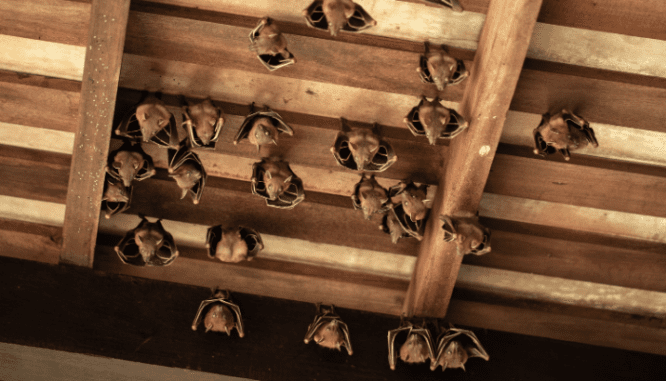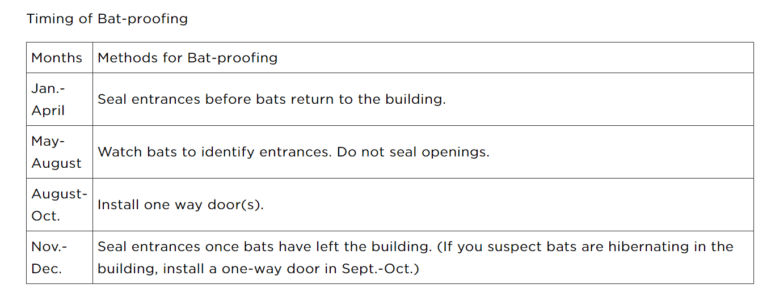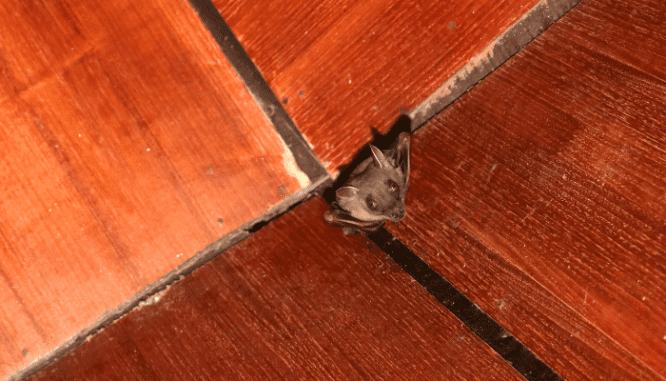Can You Sell a House With Bats Fluttering in the Attic?
- Published on
- 8 min read
-
 Christine Bartsch Contributing AuthorClose
Christine Bartsch Contributing AuthorClose Christine Bartsch Contributing Author
Christine Bartsch Contributing AuthorFormer art and design instructor Christine Bartsch holds an MFA in creative writing from Spalding University. Launching her writing career in 2007, Christine has crafted interior design content for companies including USA Today and Houzz.
Bats can roost in your attic for years and multiply into colonies of 20 to 100 bats. As Lynn Holley, a top-selling agent in Wisconsin, knows from personal experience, selling a house with bats in the attic is going to be hard and these nocturnal creatures are likely to spook buyers:
“A home inspector found bats in my seller’s historic home in downtown Madison. He couldn’t even go up into the attic because it was so noxious that he declared it unsafe. The odor was horrible, and it takes a long time for that odor to develop. Clearly, they’d had an unknown bat problem for many years. This along with other problems made the buyer walk away.”
If you’re in a similar predicament, finding a buyer for your bat-infested home will be difficult, and it may make the most sense to take care of the problem before listing.
However, there are a few good reasons why you might want to sell with the bats still in residence. The removal and cleanup of a bat infestation are complex and expensive, and it can only legally be done at certain times of the year. Read on to learn all of the information you need to make an informed decision about selling a house with bats in the attic.

4 common questions about the bats in your attic
Discovering a bat colony living in the attic is a shock most homeowners are unprepared for. Here we hope to answer a few baseline common questions so you’re aware of what you’re dealing with.
1. How common are bats in the attic?
There is no hard data available that spells out exactly how common it is to find bats in your attic. You can’t even use geography to reduce your chances of finding bats in your attic because there are more than 40 species of bats found throughout the United States, including Hawaii and Alaska — meaning that bats can thrive in all climates.
The good news is that “bats in the attic” is not a problem often encountered in the real estate world. “I’d never in my 25 years selling real estate had an issue with bats, and then all of a sudden I’ve encountered it twice one year,” says Holley.
The bad news is that bat colonies do roost in homes sometimes and the problem can go undiscovered by homeowners for years until the noise or odor become an issue. Attics are a popular roosting spot for bat colonies because they’re typically ventilated, providing the air currents that attract bats to the warm, protected space.
In colder climates, when arctic blasts blow through your attic, bats from a hibernating colony may crawl down into your walls or even into accessible heating ducts seeking the warmer, 35 to 40 degrees that bats prefer for hibernating.
Chances are, if you’ve found a stray bat inside your house, you probably have a bat problem in your attic. Fortunately, bats are opportunists and are not capable of chewing or clawing openings into your attic. Colonies only find their way into homes through existing openings, like loose shingles, gaps in attic vents, and uncovered chimneys.
So, if your home’s exterior is in good repair with no gaps or cracks allowing entry into your attic space, a single bat inside your home may not be a sign of a colony, but just a lone juvenile bat who’s lost its way.
2. Is there any harm to leaving bats in the attic?
As tempting as it is to just leave the bats for your buyer to deal with after you sell your house, you need to know the risks involved in living with a bat colony roosting in your attic.
“Everybody wants bats because bats are good for the environment, but you don’t want them living in your house,” advises Holley.
“It’s not just the bats themselves that are a problem. A bat infestation will result in a build-up of guano which presents air quality problems, especially for someone with allergies. It’s just not safe to breathe that air in the house, even if the problem is in your attic.”
Although bats won’t cause damage to gain access to your house, the build-up of guano in the attic is destructive. Bat guano will corrode both wood and drywall, and it grows mold that is dangerous to inhale.
Some bat guano is known to carry airborne fungus spores that cause histoplasmosis, which is a mild influenza-like illness that can be severe and even cause death for some people. Bats are also known carriers of rabies, which is a treatable, but fatal disease that only shows symptoms after it’s too late for treatment.
3. Are bats a protected species?
The first instinct for most sellers who want to get rid of the bats in the attic is to call an exterminator, but this is the wrong move.
Some species of bats are considered endangered and federally protected by the Endangered Species Act of 1973 or the Fish and Wildlife Coordination Act of 1956, making it illegal to kill them. Instead, you must hire a professional to relocate the bats, a process commonly known as bat exclusion.
“Many bats are a protected species, so you cannot kill them. You have to exclude them from the space, which you can only do at certain times of the year because they may have babies, called pups, which would die if you tried to remove the bats when they’re too young,” explains Holley.
4. What do real estate disclosure forms say about bats?
While bats may not be specifically mentioned on your state’s disclosure form, the pesky mammal falls under the pest category. If you know you have bats in the attic, you are legally required to note their presence in this section of the disclosure form.
“In the state of Wisconsin, sellers are legally required to complete a truthful condition report, known in some states as a disclosure report. Bats in the attic would be considered a defect, and sellers are required to disclose all known defects. That’s the case in most states,” explains Holley.
If you knowingly fail to disclose a known bat problem before selling and take measures to hide the infestation, be aware that your buyer could take you to court.

Jablonski vs. Rapalje: A batty real estate case
An undisclosed bat infestation was the center of a buyer’s lawsuit in the Jablonski vs. Rapalje case, which went to trial court and was upheld on appeal by the New York State Supreme Court in 2005.
In this case described online on the New York courts website, Stephen T.B. Jablonski, the “Buyer,” made an offer on the home of Jane and Donald Trost, the “Sellers,” through Carolyn A. Rapalje and John M. Rapalje, who were executors of the estate. Before purchasing, on multiple visits to the property, the buyer noticed smells, stains, and animal droppings in the attic several times, including evidence of the attic being recently swept out on several occasions.
The buyer inquired about these issues. The sellers told him that these stains and smells were from birds getting into the attic from a broken pipe. The buyer was assured by the sellers and their real estate agent that this issue would be fixed before closing.
The buyer then submitted a list of 23 questions for the seller to answer after the home inspection but didn’t include any questions about the attic. And his home inspector did not find evidence of bats during the inspection.
After moving in and discovering the bat infestation, the buyer sued the sellers, the estate executors, the listing agent, and his own home inspector. He won his case against everyone.
When the sellers appealed, the New York State Supreme Court upheld the buyer’s win against all defendants, except the home inspector.
Two New York State Supreme Court Justices did dissent on this ruling. The dissent stated that “caveat emptor” (“let the buyer beware”) applied in this case, since the buyer was aware of an issue in the attic and had a duty to investigate rather than trusting the seller’s word that the issue was the result of birds.
While there was disagreement within the state supreme court, in the end, the ruling was upheld. The case was also referenced in a real estate fraud claim case in an April 10, 2019, decision, This is clear evidence that failing to disclose a known bat infestation in your attic is simply creating a legal headache for yourself.

If you’re selling a home with bats…
In Jablonski vs. Rapalje, the sellers’ depositions revealed that they were fully aware of the bat problem before selling, and the buyer’s expert proved that they took steps to conceal the bat infestation from the buyer. However, it’s not always obvious when a house has bats in the attic.
“It is possible for sellers to live in a house for years and not be aware that they have a bat infestation in their attic until the home inspection. Not everyone knows the difference between mouse or bird droppings and bat guano,” explains Holley.
Maybe you know that you’re selling a house that has bats in the attic, or maybe the bat colony is only discovered during the buyer’s home inspection. Either way, once you know about the problem, you need to deal with it.
1. Tell your real estate agent
“It’s an agent’s job to help the seller figure out how to tackle the bat infestation issue, or at least get them pointed in the right direction. It’s not difficult, but it is an expensive process,” explains Holley.
While your agent can help guide you on how to deal with the bats, you cannot just tell your agent about it and think you’re done dealing with your bat problem. It’s still your duty as the seller to include the information on the disclosure form.
In fact, real estate agents in Wisconsin are not allowed to help homeowners complete their disclosure forms, which are known as condition reports in the state of Wisconsin. Make sure to check your individual state’s disclosure rules and know what’s required of you.
2. Make any necessary disclosures
For sellers listing their home as-is (say if it’s an inherited property that you’ve never personally lived in), you may simply want to disclose the bat problem and hope that you find an investor or renovation-minded buyer willing to deal with the issue.
However, if you intend to fix up your home in the hopes of maximizing its value, there’s no point in investing money in the property while leaving the bats in the attic. No buyer will pay top dollar to buy a home with a bat infestation.
Remember, you are legally required to disclose the issue. And you should probably disclose the recent bat infestation, even if you’ve had the bat colony excluded from your house and sealed the attic up to prevent future infestations.
“I tell my sellers that it’s better to over disclose than under disclose. Buyers think highly of a seller and the house as a result of over-disclosure. So I recommend disclosing the recent bat infestation, unless they are a million percent sure that the bat infestation problem is resolved,” advises Holley.
Keep in mind that it won’t take a home inspector much investigation to find evidence of a bat problem recently resolved in your attic. And if your buyers think you’ve been hiding something, that puts you at a disadvantage.
You’ll be in the weaker position when negotiating any repair requests, and the failure to disclose the recent bat infestation issue may be enough of a red flag for your buyer to walk away altogether.
3. Consult the calendar… and maybe wait to sell
Unlike other pest infestations, protected bats cannot be exterminated whenever you need them gone. Instead, you need to hire a professional to perform a bat exclusion — and this can only be done at certain times during the year.
“For my sellers, their bat problem was so extensive that they had to take their house off the market to fix it, mainly because they had to wait for their bat removal to be done at the right time of year,” recalls Holley.
Endangered bats have their babies, or pups, during the summer. Relocating a colony at this time would disrupt their maternity season, causing the mother bats to abandon their pups, who cannot yet survive on their own.
If you discover your bat infestation in the months of May to August, you’re going to have to wait until summer is over to have your professional exclusion done, which means you’ll need to wait on selling your house, too.

4. Call in the removal pros
When you discover a colony of bats living in your attic, it’s only natural to want to immediately seal the place up tight. But you won’t be keeping the bats out, you’ll just be sealing them in. Instead, you need to keep an eye on them in order to identify their entry points, and then call in a pro.
“If you know that you have bats in the attic, you need to hire a professional to get rid of them because it’s not an easy or inexpensive process. Not only do you need to remove the bats, but you’ve got to disinfect and treat the space, and then you’ve got to reinsulate,” advises Holley.
The bat exclusion and cleanup will cost you at least a few grand, and may reach up to $10,000 or more, depending on how much cleanup and damage repair is needed.

You should be able to find a company in every city that handles bat exclusions in a humane way that meets all of the legal requirements.
Known as bat rehabilitators or bat rescuers, these professionals are specifically trained in how to properly exclude bats from your attic and relocate the colony without doing any harm to the bats. You can find a list of these trained professionals at the Bat World Sanctuary website.
If there are no trained bat professionals in your area, your next step is to contact your state’s wildlife agency or your state’s Department of Natural Resources.
There are hundreds of resources online to learn about how to deal with bats, which may tempt you into handling the problem yourself. And it is possible to relocate a bat colony on your own, but that’s not the smart play if you’re looking to sell soon.
5. Save receipts of the work and provide a guarantee
Since you’re going to need to disclose the bat infestation, you’ll want paperwork from a professional that guarantees the success of a removal. A buyer isn’t going to trust your word that the problem is 100% resolved.
“Sellers have to provide a report and paid receipts as proof that the bat infestation has been taken care of if it’s done as part of a home inspection repair request,” explains Holley.
“Plus, professional bat exclusions come with a warranty that’s transferable to your buyer. Also, if the seller takes care of the bat removal before going on the market, and they disclose it, they’re going to need receipts to provide proof that it was professionally done.”
While most of the world has gone digital these days, it’s in your best interest to keep paper copies of the receipts and warranties that you can hand right over to your buyer.
FYI, Don’t bet on a bat house to solve your bat problem
If you’ve been digging into all the bat research available online, you’ll have learned how beneficial it is to have bats around. Bats not only eat tons of insects that destroy gardens (and pesky bugs like mosquitos!), many regions also rely on bats for pollination and seed dispersal.
This knowledge might have you thinking about keeping your bats nearby after removing them from your attic by hanging a bat house on your property.
Do yourself a favor and don’t do it.
Your attic bats aren’t simply going to pick up and move into a bat house just because you install one. You’re still going to have to pay for a professional to exclude them from the house.
“Bat houses are nice for bats, but I wouldn’t advise putting up a bat house on your home if you’re planning to sell, because I don’t know that you would sell,” advises Holley.
Plus, you’re just creating a new problem for your buyers that they may not want.
For example, bat houses need to be maintained monthly and frequently cleaned of bat guano. Once you’ve relocated the bats in your attic, simply inform your buyers that bats were once residents and they can decide for themselves whether or not they want to install a bat house for future bats.

Selling a house with bats: Don’t take any shortcuts
Yes, you can sell a house with bats in the attic if you can find a buyer willing to take on the problem, but it’s not in your best financial interest. It only makes sense to list a house with an unresolved bat infestation if you are selling it as-is, and the house has a whole host of other defects already lowering its value.
However, if your home is in great shape, except for the bats in your attic, it’s wiser to have the bats relocated before you list your home. If you want to sell it fast and for the most amount of money, it needs to be bat-free.
Header Image Source: (Georgy Trofimov / Unsplash)
